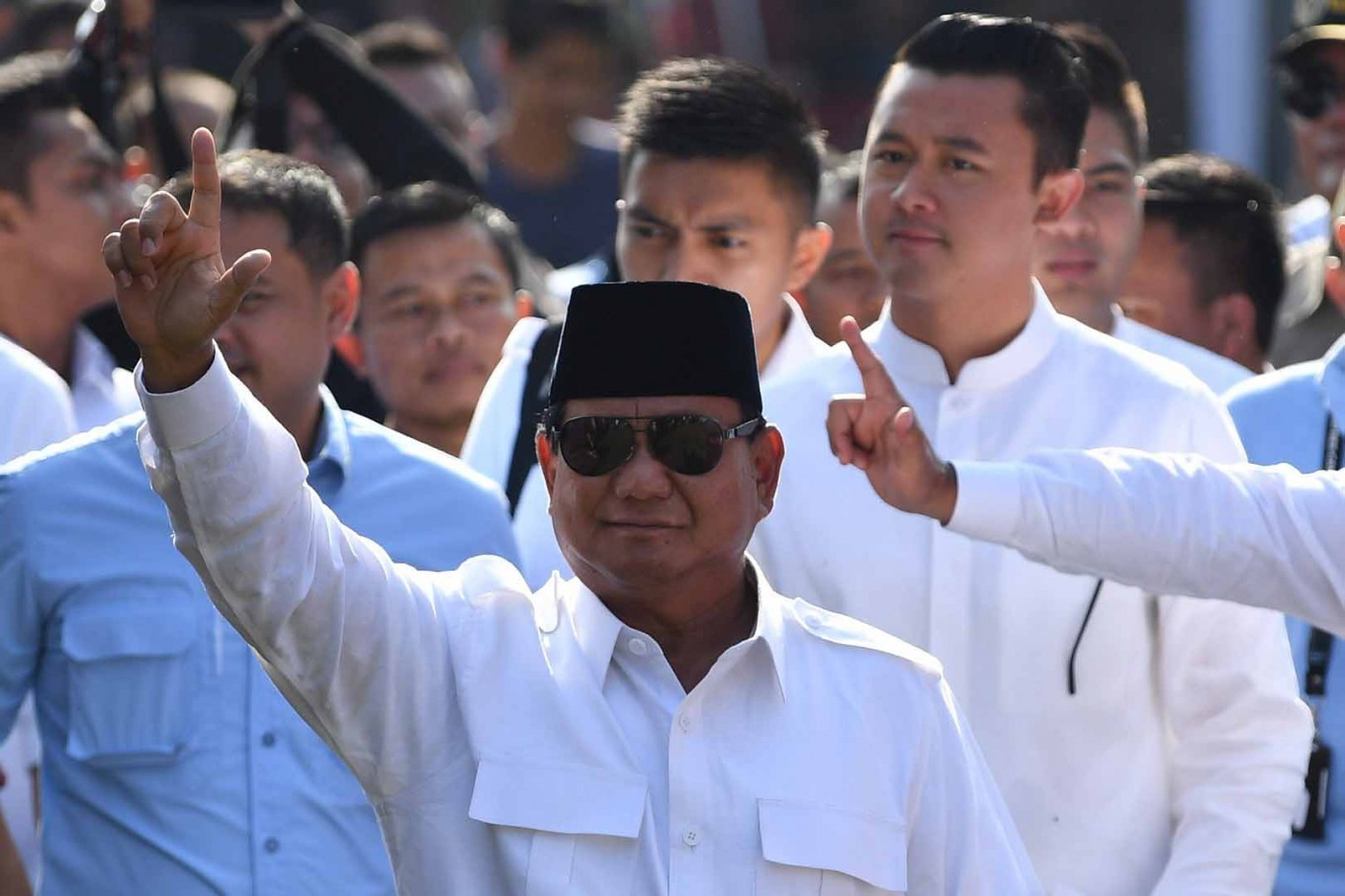News
Prabowo’s nationalist image in question amid rampant hate crimes
Tenggara Strategics July 16, 2025 Presidential candidate Prabowo Subianto. (Antara/Sigid Kurniawan)
Presidential candidate Prabowo Subianto. (Antara/Sigid Kurniawan)
When a mob rampaged through Maria Veronica Nina’s villa in Sukabumi, West Java, she would have had every right to feel vengeful for the hate crime committed against her property.
On June 27, a demonstration turned into a riot inside Maria’s villa, which at the time was rented by a group of Christian students for a religious retreat. Videos that circulated from the event showed perpetrators taking down a wooden cross from the wall, destroying doors and windows as they shouted obscene remarks because the villa was used as a place of worship by a minority group.
Seven suspects have since been arrested by law enforcement, and the ensuing reactions saw widespread condemnation from government officials and civil society groups alike.
As compensation, Maria was given Rp 100 million (US$6,164) by West Java Governor Dedi Mulyadi to repair her property, a controversial move as many perceived the act to be performative and failed to address the systematic issue at hand. However, in a mark of good faith, she chose to donate the money and return it to the community for the construction of new mosques in the area.
Although the case presented a “happy ending”, hate crime remains a rampant and pressing issue across the country.
A study by Amnesty International Indonesia cited 82 cases of religion-based violence and intimidation from 2022 to 2024. These incidents range from the prohibition of worship, destruction of prayer sites, and objections to the construction of new religious buildings. Similarly, another study made by Setara Institute corroborated Amnesty’s findings, reporting a sharp increase in religious hate from 2023 to 2024. The Commission for Missing Persons and Victims of Violence (Kontras) also found 23 cases of religion-based crimes in 2025 alone. Both Setara and Kontras found that most incidents occurred in West Java.
Cases of religion-based hate crimes paint a larger picture of the polarizing reality of modern Indonesia. One commonality among these incidents across all other cases of hate crime is that they befall minority groups, the most vulnerable in society.
Also last month, Papuan university students received a threat in the form of anonymous packages containing a severed pig’s head in Bali and a live lizard in Surabaya.
The Papua Student Alliance (AMP) claimed that its members in Bali were sent the rotten pig’s head as a form of intimidation for their critical activism against the state’s oppressive actions in Papua. “We realize this is an act of terror carried out by reactionary groups and those in power to intimidate Papuan students, aiming to make them afraid of participating in critical organizational activities,” said Jeeno Alfred Dogomo, head of the AMP.
In Surabaya, the lizard was sent when the Papuan students were organizing an anti-military and anti-investment campaign in Papua.
Acts of anonymous terror seem to be the name of the game to intimidate political dissidents of the regime. In March, Francisca Christy Rosana, a journalist and host of the critical political podcast Bocor Alus from Tempo was also sent an anonymous package containing a severed pig’s head. Although the podcast had other male hosts, the package was solely addressed to Francisca, the only female figure in the show.
The pressing question now is, will President Prabowo Subianto continue to tolerate these rising instances of hate and terror? The former Army general has long praised strongmen like Turkey’s founding father, Mustafa Kemal Atatürk, Russian President Vladimir Putin, and Singapore’s Lee Kuan Yew, for their ability to unite a nation under stability.
Prabowo himself comes from an inter-religious household. His father, Sumitro Djojohadikusumo, was a Javanese Muslim who married Dora Marie Sigar, a Minahasan Christian. While Prabowo chose to follow his father’s religion, his brother and most trusted aide, Hashim Djojohadikusumo, went with their mother’s.
Last Christmas, Prabowo proudly proclaimed his roots, claiming his existence is a by-product of what it means to be Indonesian. “I was also born to a Christian mother. So, perhaps you could say that I am proof of a Pancasila family,” the President said.
Having spent most of his adolescent years abroad in the West, the President is well-versed in the liberal “to each their own” rhetoric. Reinforced with his hardline nationalist stance, Prabowo places national unity above all else.
Yet, when Prabowo ran for the presidency in both 2014 and 2019, it was he who perpetuated the country’s polarizing present. During both presidential runs, Prabowo latched onto hardline-Islamist groups to garner support from their large congregations.
As the adage goes, a great nation is measured by how it can treat its most vulnerable members. Prabowo must move beyond preaching unity and take firm action to uplift those who have been systematically sidelined across generations, and for the most part, perpetuated under his watch.
What we've heard
A researcher from a diversity institution said that the spread of intolerance among the younger generation is being carried out through social media. According to this source, more than 50 percent of young people spend a significant amount of time on the internet and social media content has become a medium for the spread of radical content. “This is worsened by our society’s low level of digital literacy,” he said.

